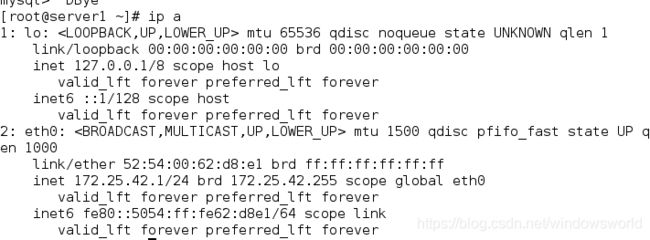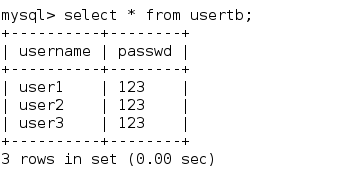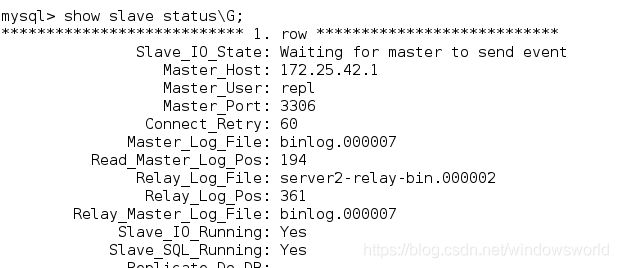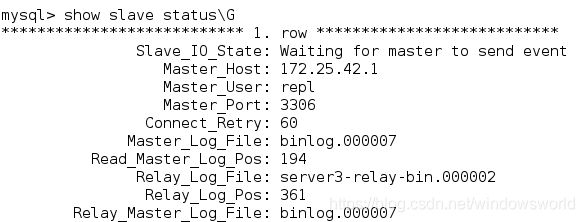Mysql实现高可用及vip迁移
- 实验配置
| 主机名(ip) | 用途 |
|---|---|
| server1(172.25.42.1) | 节点 1master |
| server2(172.25.42.2) | 节点2 备master |
| server3(172.25.42.3) | 节点3 slave |
| server4(172.25.42.4) | 调度器 |
- 配置server1,server2,server3基于gtid的主从复制
- 配置文件(server1-3)
值修改server_id即可
vim /etc/my.cnf



2.在server1-server3安装主从设备的插件
server1
mysql> install plugin rpl_semi_sync_master soname ‘semisync_master.so’;
mysql> install plugin rpl_semi_sync_slave soname ‘semisync_slave.so’;
mysql> set global rpl_semi_sync_master_enabled=1;
mysql> set global rpl_semi_sync_master_timeout=100000000000000000;

mysql> show variables like ‘%rpl%’;
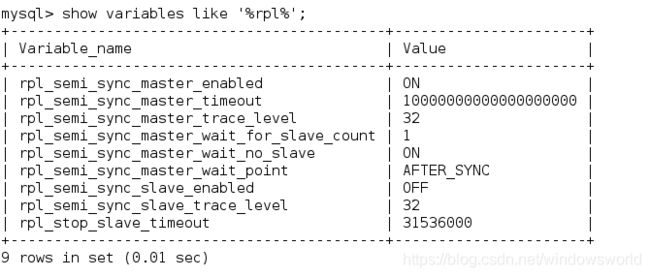
server2
mysql> change master to master_host=‘172.25.42.1’,master_user=‘repl’,master_password=‘Wsp+123ld’,master_auto_position=1;
mysql> install plugin rpl_semi_sync_master soname ‘semisync_master.so’;
mysql> install plugin rpl_semi_sync_slave soname ‘semisync_slave.so’;
mysql> set global rpl_semi_sync_master_enabled=1;
mysql> stop slave io_thread;
mysql> start slave io_thread;mysql> start slave;
mysql> show slave status\G;
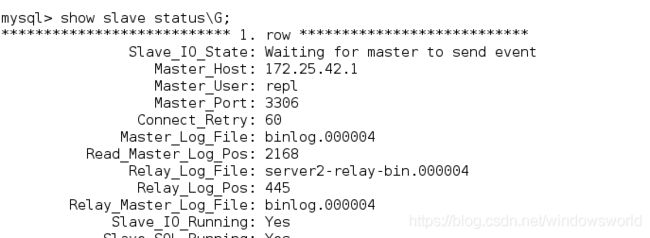
server3
mysql> change master to master_host=‘172.25.42.1’,master_user=‘repl’,master_password=‘Wsp+123ld’,master_auto_position=1;
mysql> install plugin rpl_semi_sync_master soname ‘semisync_master.so’;
mysql> install plugin rpl_semi_sync_slave soname ‘semisync_slave.so’;
mysql> set global rpl_semi_sync_master_enabled=1;
mysql> stop slave io_thread;
mysql> start slave io_thread;mysql> start slave;
mysql> show slave status\G;

- 检测连通性
server1查看
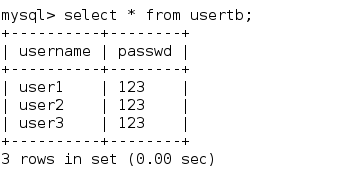
server2查看
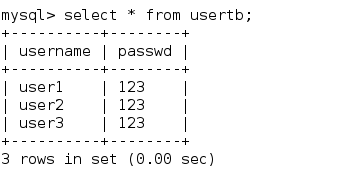
server3查看
- server4进行MHA的配置
1.下载安装所需安装包

2.安装(并非全部安装)
[root@server4 ~]# yum install mha4mysql-manager-0.58-0.el7.centos.noarch.rpm mha4mysql-node-0.58-0.el7.centos.noarch.rpm perl-* -y

3.MHA是通过ssh服务来保存master与slave之间的二进制文件的,所以要保证server1-server4之间实行免秘登陆
在server4上生成钥匙和锁并将钥匙分发给server1-server3
[root@server4 ~]# ssh-copy-id server1
[root@server4 ~]# ssh-copy-id server2
[root@server4 ~]# ssh-copy-id server3
这只保证了server4能够与server1-server3之间互相连接,并不能让server1-server3之间互相通信,所以需要将公钥与私钥都分发给server1-server3

4.將MHAnode包发送给server1-server3并安装

[root@server1 ~]# yum install mha4mysql-node-0.58-0.el7.centos.noarch.rpm -y
[root@server2 ~]# yum install mha4mysql-node-0.58-0.el7.centos.noarch.rpm -y
[root@server3 ~]# yum install mha4mysql-node-0.58-0.el7.centos.noarch.rpm -y
- 在server4上编辑高可用的配置文件并检测是否成功
创建高可用的配置文件目录
编辑mha的配置文件
[root@server4 ~]# cat /etc/masterha/app1.cnf
[server default]
manager_log=/var/log/masterha.log
manager_workdir=/etc/masterha
master_binlog_dir=/etc/masterha
password=Wsp+123ld
ping_interval=1
remote_workdir=/tmp
repl_password=Wsp+123ld
repl_user=repl
ssh_user=root
user=root
[server1]
hostname=172.25.42.1
port=3306
[server2]
candidate_master=1
check_repl_delay=0
hostname=172.25.42.2
port=3306
[server3]
hostname=172.25.42.3
no_master=1
port=3306
-
开启主库对root用户赋予远程登陆权限
mysql> grant all on . to root@’%’ identified by ‘Wsp+123ld’; -
在server2与server3上设置只读
mysql> set global read_only=1; -
检测ssh的配置是否成功
[root@server4 ~]# masterha_check_ssh --conf=/etc/masterha/app1.cnf
- 检测mysql的复制情况
- 测试
手动测试
1.关闭server1(master),然后在server4上手动切换master到server2
[root@server1 ~]# systemctl stop mysqld

[root@server4 ~]# masterha_master_switch --master_state=dead --conf=/etc/masterha/app1.cnf --dead_master_ip=172.25.42.1 --dead_master_host=172.25.42.1 --dead_master_port=3306 --new_master_host=172.25.42.2 --new_master_port=3306
执行该命令后,需要进行两次输入确定,两次都选择yes。
![]()
![]()
![]()
2.分别在server2与server3上进行查看状态
server2查看
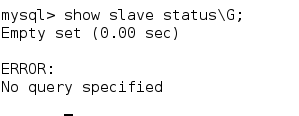
server2在server1down掉后提供master的角色,所以无备份状态。
server3查看
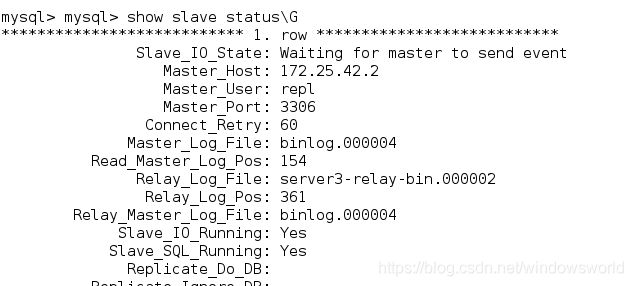 可以看到server2成为了新的master
可以看到server2成为了新的master
再次开启server1将server1作为slave开始备份

- 恢复server1为主备
- 删除/etc/masterha/app1.failover.complete(每次执行手动切换后都会生成该文件,若不删除则无法进行手动切换)
[root@server4 ~]# cd /etc/masterha/
[root@server4 masterha]# ls
app1.cnf app1.failover.complete
[root@server4 masterha]# rm -fr app1.failover.complete
[root@server4 masterha]# ls
app1.cnf

- 在server4上手动切换新的master为server1
[root@server4 masterha]# masterha_master_switch --conf=/etc/masterha/app1.cnf --master_state=alive --new_master_host=172.25.42.1 --new_master_port=3306 --orig_master_is_new_slave --running_updates_limit=10000
该切换也需要输入选项,也都输入yes即可

- 自动切换
1.值ixng下列命令
[root@server4 masterha]# nohup master_manager --conf=/etc/masterha/app1.cnf --remove_dead_master_conf --ignore_last_failover < /dev/null > /var/log/masterha.log 2>&1 &
2.关闭master
[root@server1 ~]# systemctl stop mysqld
![]()
3.查看server2与server3备份状态
server2
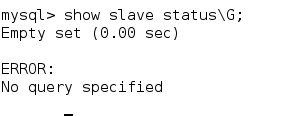
server3
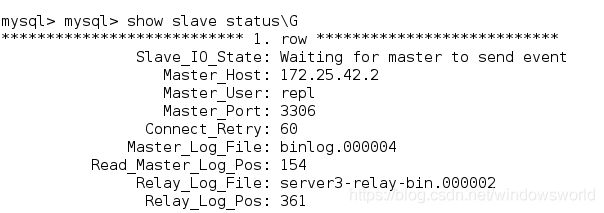
vip配置
1.修改配置文件
[root@server4 masterha]# vim app1.cnf
在配置文件中加入下列两条命令
master_ip_failover_script=/usr/local/bin/master_ip_failover
master_ip_online_change_script=/usr/local/bin/master_ip_online_change
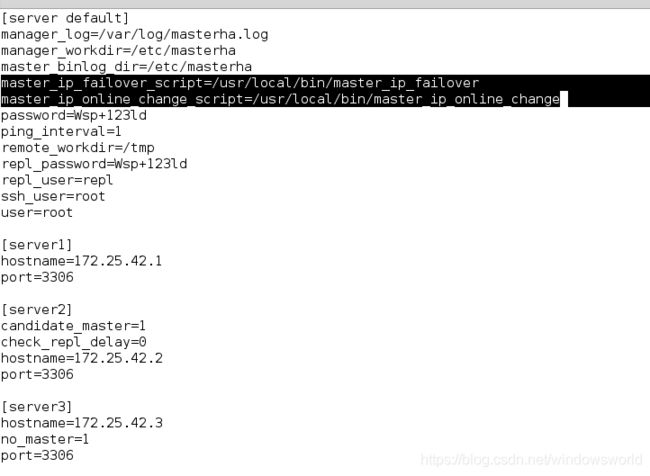
2.在/usr/local/bin下添加master_ip_failover与master_ip_online_change者两个文件
![]()
master_ip_failover内容如下
#!/usr/bin/env perl
use strict;
use warnings FATAL => 'all';
use Getopt::Long;
my (
$command, $ssh_user, $orig_master_host, $orig_master_ip,
$orig_master_port, $new_master_host, $new_master_ip, $new_master_port
);
my $vip = '172.25.42.100/24';##将该部分改为自身网段即可
my $key = '1';
my $ssh_start_vip = "/sbin/ip addr add $vip dev eth0";##修改这两行为网卡方式修改vip
my $ssh_stop_vip = "/sbin/ip addr del $vip dev eth0;
GetOptions(
'command=s' => \$command,
'ssh_user=s' => \$ssh_user,
'orig_master_host=s' => \$orig_master_host,
'orig_master_ip=s' => \$orig_master_ip,
'orig_master_port=i' => \$orig_master_port,
'new_master_host=s' => \$new_master_host,
'new_master_ip=s' => \$new_master_ip,
'new_master_port=i' => \$new_master_port,
);
exit &main();
sub main {
print "\n\nIN SCRIPT TEST====$ssh_stop_vip==$ssh_start_vip===\n\n";
if ( $command eq "stop" || $command eq "stopssh" ) {
my $exit_code = 1;
eval {
print "Disabling the VIP on old master: $orig_master_host \n";
&stop_vip();
$exit_code = 0;
};
if ($@) {
warn "Got Error: $@\n";
exit $exit_code;
}
exit $exit_code;
}
elsif ( $command eq "start" ) {
my $exit_code = 10;
eval {
print "Enabling the VIP - $vip on the new master - $new_master_host \n";
&start_vip();
$exit_code = 0;
};
if ($@) {
warn $@;
exit $exit_code;
}
exit $exit_code;
}
elsif ( $command eq "status" ) {
print "Checking the Status of the script.. OK \n";
exit 0;
}
else {
&usage();
exit 1;
}
}
sub start_vip() {
`ssh $ssh_user\@$new_master_host \" $ssh_start_vip \"`;
}
sub stop_vip() {
return 0 unless ($ssh_user);
`ssh $ssh_user\@$orig_master_host \" $ssh_stop_vip \"`;
}
sub usage {
print
"Usage: master_ip_failover --command=start|stop|stopssh|status --orig_master_host=host --orig_master_ip=ip --orig_master_port=port --new_master_host=host --new_master_ip=ip --new_master_port=port\n";
}
master_ip_online_change部分如下所示
#!/usr/bin/env perl
use strict;
use warnings FATAL =>'all';
use Getopt::Long;
my $vip = '172.25.0.100/24'; # Virtual IP
my $key = "1";
my $ssh_start_vip = "/sbin/ip addr add $vip dev eth0";
my $ssh_stop_vip = "/sbin/ip addr del $vip dev eth0;
my $exit_code = 0;
my (
$command, $orig_master_is_new_slave, $orig_master_host,
$orig_master_ip, $orig_master_port, $orig_master_user,
$orig_master_password, $orig_master_ssh_user, $new_master_host,
$new_master_ip, $new_master_port, $new_master_user,
$new_master_password, $new_master_ssh_user,
);
GetOptions(
'command=s' => \$command,
'orig_master_is_new_slave' => \$orig_master_is_new_slave,
'orig_master_host=s' => \$orig_master_host,
'orig_master_ip=s' => \$orig_master_ip,
'orig_master_port=i' => \$orig_master_port,
'orig_master_user=s' => \$orig_master_user,
'orig_master_password=s' => \$orig_master_password,
'orig_master_ssh_user=s' => \$orig_master_ssh_user,
'new_master_host=s' => \$new_master_host,
'new_master_ip=s' => \$new_master_ip,
'new_master_port=i' => \$new_master_port,
'new_master_user=s' => \$new_master_user,
'new_master_password=s' => \$new_master_password,
'new_master_ssh_user=s' => \$new_master_ssh_user,
);
exit &main();
sub main {
#print "\n\nIN SCRIPT TEST====$ssh_stop_vip==$ssh_start_vip===\n\n";
if ( $command eq "stop" || $command eq "stopssh" ) {
# $orig_master_host, $orig_master_ip, $orig_master_port are passed.
# If you manage master ip address at global catalog database,
# invalidate orig_master_ip here.
my $exit_code = 1;
eval {
print "\n\n\n***************************************************************\n";
print "Disabling the VIP - $vip on old master: $orig_master_host\n";
print "***************************************************************\n\n\n\n";
&stop_vip();
$exit_code = 0;
};
if ($@) {
warn "Got Error: $@\n";
exit $exit_code;
}
}
elsif ( $command eq "start" ) {
# all arguments are passed.
# If you manage master ip address at global catalog database,
# activate new_master_ip here.
# You can also grant write access (create user, set read_only=0, etc) here.
my $exit_code = 10;
eval {
print "\n\n\n***************************************************************\n";
print "Enabling the VIP - $vip on new master: $new_master_host \n";
print "***************************************************************\n\n\n\n";
&start_vip();
$exit_code = 0;
};
if ($@) {
warn $@;
exit $exit_code;
}
exit $exit_code;
}
elsif ( $command eq "status" ) {
print "Checking the Status of the script.. OK \n";
`ssh $orig_master_ssh_user\@$orig_master_host \" $ssh_start_vip \"`;
exit 0;
}
else {
&usage();
exit 1;
}
}
# A simple system call that enable the VIP on the new master
sub start_vip() {
`ssh $new_master_ssh_user\@$new_master_host \" $ssh_start_vip \"`;
}
# A simple system call that disable the VIP on the old_master
sub stop_vip() {
`ssh $orig_master_ssh_user\@$orig_master_host \" $ssh_stop_vip \"`;
}
sub usage {
print
"Usage: master_ip_failover --command=start|stop|stopssh|status --orig_master_host=host --orig_master_ip=ip --orig_master_port=port --new_master_host=host --new_master_ip=ip --new_master_port=port\n";
}
- 测试
1.切换master为server1(记得删除手动切换的文件)
[root@server4 masterha]# masterha_master_switch --conf=/etc/masterha/app1.cnf --master_state=alive --new_master_host=172.25.42.1 --new_master_port=3306 --orig_master_is_new_slave --running_updates_limit=10000
2.查看vip
